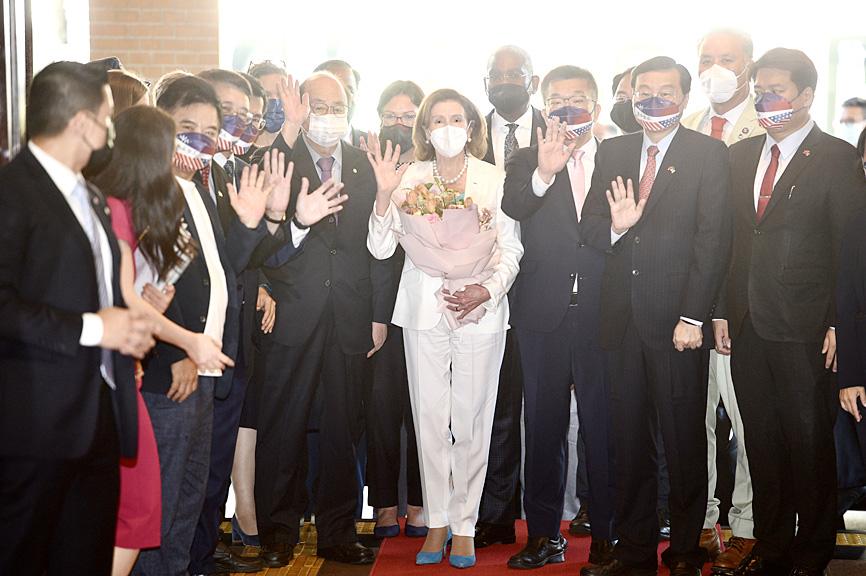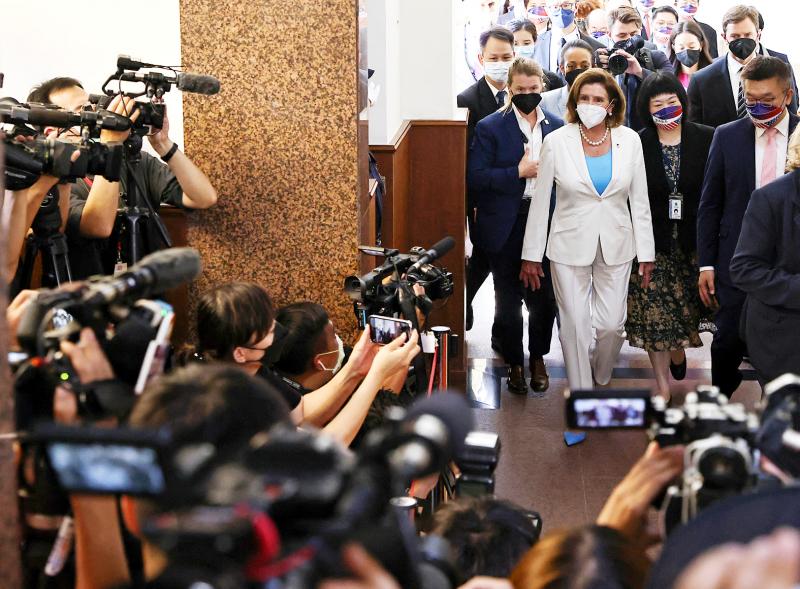The passage of the draft “creating helpful incentives to produce semiconductors (CHIPS) and science act” in the US Congress last month was a recognition of the common interests between Taiwan and the US, and opens the door for better economic exchanges between the two countries, US House of Representatives Speaker Nancy Pelosi told reporters yesterday.
The 82-year-old Democrat, who is the highest-ranking US official to visit Taiwan in 25 years, arrived at Taipei International Airport (Songshan airport) on Tuesday night.
“At the same time that the trip is taking place, we have passed the CHIPS for America act in recognition of our common economic interests,” she told a news conference after a meeting with President Tsai Ing-wen (蔡英文).

Lo Pei-de, Taipei Times
Asked whether she can promise any concrete and tangible benefits that would offset the cost of her trip that Taiwanese are expected to pay in the coming weeks, Pelosi said: “This is something that opens the doors for us for better economic exchanges. Several Taiwanese companies are already planning to invest in chip manufacturing in the US. The entrepreneurial spirit, the intellectual resources and the success of the tech industry in Taiwan has really been a model... With the CHIPS act, we are facilitating to reach our shared goal of increasing our partnership.”
Pelosi said that “a trade agreement might be possible and could occur soon,” without giving any details.
Pelosi yesterday also visited the Legislative Yuan and held a closed-door meeting with Deputy Legislative Speaker Tsai Chi-chang (蔡其昌) and the legislative caucus whips of four political parties.

Photo: Ann Wang, REUTERS
Legislative Yuan President You Si-kun (游錫堃), who could not meet with Pelosi in person after testing positive for COVID-19, spoke with her via videoconference.
Taiwan has become a beacon of democracy for the Chinese-speaking parts of the world after three peaceful transitions of power over the past two decades, You wrote on Facebook.
He praised Pelosi for leading a delegation to Taiwan despite the intimidation from China, adding that this showed the world that Taiwan-US relations are rock solid, and that Taiwan would not be alone in defending democracy.
Taiwan’s People Party (TPP) caucus whip Andy Chiu (邱臣遠) said he told Pelosi that the two sides should quickly sign a trade agreement.
Taiwan and the US “need to tackle inflation, labor shortages and issues related to supply chains with concrete actions,” he said.
Pelosi and the caucus whips also exchanged views on the National Security Law Beijing imposed in Hong Kong and the Comprehensive and Progressive Agreement for Trans-Pacific Partnership (CPTPP), he said.
New Power Party caucus whip Chiu Hsien-chih (邱顯智) told reporters that they discussed human rights issues.
Pelosi holds the view that human rights and security are two sides of the same coin, and must be considered together, Chiu Hsien-chih said.
Pelosi and the caucus whips also discussed the situations in Tibet, Xinjiang and Hong Kong, as well as the plight of human rights lawyers and non-governmental organization employees in China, he said.
They also talked about differences between Taiwan and China, such as the ability of Taiwanese human rights lawyers to not only participate in elections, but hold public office, Chiu Hsien-chih added.
Additional reporting by Huang Ching-hsuan

Chinese Nationalist Party (KMT) Chairman Eric Chu (朱立倫), spokeswoman Yang Chih-yu (楊智伃) and Legislator Hsieh Lung-chieh (謝龍介) would be summoned by police for questioning for leading an illegal assembly on Thursday evening last week, Minister of the Interior Liu Shyh-fang (劉世芳) said today. The three KMT officials led an assembly outside the Taipei City Prosecutors’ Office, a restricted area where public assembly is not allowed, protesting the questioning of several KMT staff and searches of KMT headquarters and offices in a recall petition forgery case. Chu, Yang and Hsieh are all suspected of contravening the Assembly and Parade Act (集會遊行法) by holding

PRAISE: Japanese visitor Takashi Kubota said the Taiwanese temple architecture images showcased in the AI Art Gallery were the most impressive displays he saw Taiwan does not have an official pavilion at the World Expo in Osaka, Japan, because of its diplomatic predicament, but the government-backed Tech World pavilion is drawing interest with its unique recreations of works by Taiwanese artists. The pavilion features an artificial intelligence (AI)-based art gallery showcasing works of famous Taiwanese artists from the Japanese colonial period using innovative technologies. Among its main simulated displays are Eastern gouache paintings by Chen Chin (陳進), Lin Yu-shan (林玉山) and Kuo Hsueh-hu (郭雪湖), who were the three young Taiwanese painters selected for the East Asian Painting exhibition in 1927. Gouache is a water-based

Taiwan would welcome the return of Honduras as a diplomatic ally if its next president decides to make such a move, Minister of Foreign Affairs Lin Chia-lung (林佳龍) said yesterday. “Of course, we would welcome Honduras if they want to restore diplomatic ties with Taiwan after their elections,” Lin said at a meeting of the legislature’s Foreign Affairs and National Defense Committee, when asked to comment on statements made by two of the three Honduran presidential candidates during the presidential campaign in the Central American country. Taiwan is paying close attention to the region as a whole in the wake of a

OFF-TARGET: More than 30,000 participants were expected to take part in the Games next month, but only 6,550 foreign and 19,400 Taiwanese athletes have registered Taipei city councilors yesterday blasted the organizers of next month’s World Masters Games over sudden timetable and venue changes, which they said have caused thousands of participants to back out of the international sporting event, among other organizational issues. They also cited visa delays and political interference by China as reasons many foreign athletes are requesting refunds for the event, to be held from May 17 to 30. Jointly organized by the Taipei and New Taipei City governments, the games have been rocked by numerous controversies since preparations began in 2020. Taipei City Councilor Lin Yen-feng (林延鳳) said yesterday that new measures by